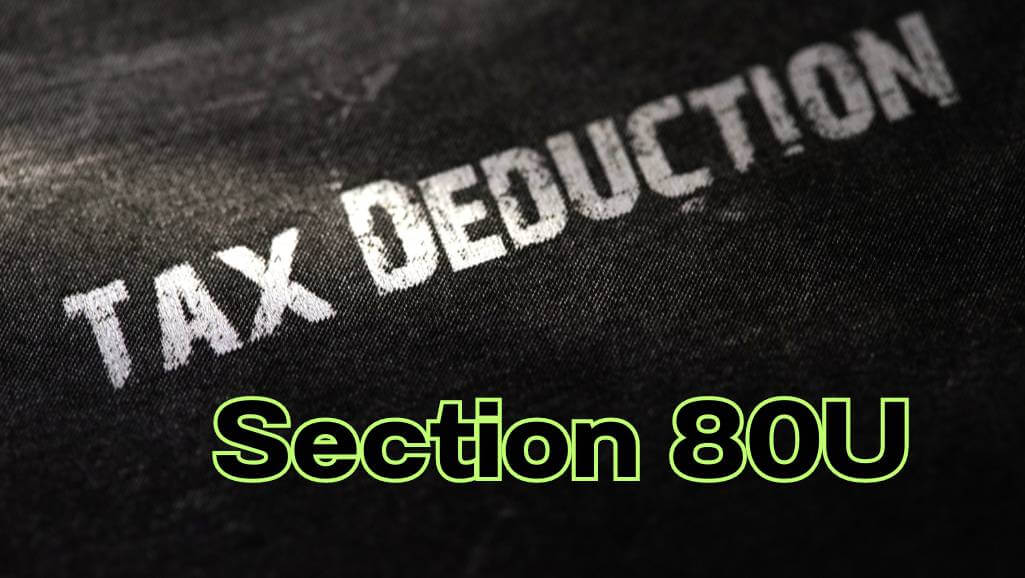In India’s income tax laws, specific sections extend tax advantages to individuals or their family members grappling with disabilities. Among these provisions, Section 80U offers tax benefits to individuals coping with disabilities. While Section 80DD caters to tax benefits for individuals whose dependent family members experience disabilities, this article focuses on elucidating the tax benefits provided by Section 80U.

Quantum of Deduction under 80U
Under Section 80U, individuals with disabilities can claim a deduction of Rs. 75,000, whereas those with severe disabilities can claim a deduction of Rs. 1,25,000.
| Category | Permitted Deductions |
|---|---|
| A person with a disability | Rs. 75,000/- |
| A person with a severe disability | Rs. 1,25,000/- |
Eligibility for Deduction under Section 80U
Resident individuals certified as persons with disabilities by medical authorities are eligible for tax benefits under Section 80U. The criteria for disability entail a minimum of 40 percent disability, as certified by medical authorities.
The definition of disability under this section encompasses conditions such as
- Blindness
- Low vision
- Leprosy-cured
- Hearing impairment
- Loco motor disability
- Mental retardation
- Mental illness
Additionally, severe disability, constituting 80 percent or more disability, encompasses multiple disabilities, autism, and cerebral palsy.
Which Disabilities Fall Under the Purview of Section 80U?
Section 80U encompasses the following categories of disabilities:
- Locomotor disability: Impairments affecting joint muscles or bones result in severely restricted limb movements or cerebral palsy.
- Low vision: Visual impairments that cannot be fully corrected by surgery or standard refractive correction, allowing individuals to use their vision with devices.
- Blindness: Complete absence of sight or visual field limitation of 20 degrees or worse, or visual acuity less than 6/60 Snellen after corrective lenses.
- Leprosy cured: Individuals cured of leprosy but still experiencing disabilities such as loss of sensation in feet or hands, paresis in eyelid and eye, or extreme deformities hindering occupational activities.
- Mental retardation: Incomplete or arrested development of mental capacities leading to subnormal intelligence levels.
- Hearing impairment: Loss of hearing power by at least 60 decibels.
- Autism: This disorder impacts brain development, affects perception and socialisation, and leads to difficulties in social interaction and communication.
- Cerebral palsy: A group of movement disorders in early childhood characterised by poor coordination, stiff muscles, weak muscles, tremors, and potential issues with sensation, vision, hearing, and speaking.
- Mental illness: Encompassing various other mental disorders.
A taxpayer is not severely disabled if their disability ranges from 40% to below 80%. However, if the disability exceeds 80%, it is classified as severe. The deduction limit varies based on the severity of the disability.
Requirements for Claiming Deductions
- Documentation requirements are minimal, with the principal necessity being a disability certificate issued by a recognised medical authority in Form 10-IA.
- There’s no obligation to furnish bills for treatment costs or related expenses.
- To avail of benefits under this section, individuals must furnish a medical certificate verifying the disability and their income tax returns for the applicable Assessment Year (AY) as per Section 139.
- Even if the disability assessment certificate expires, deductions can still be claimed in the expiry year, albeit a fresh certificate will be needed from the subsequent year.
- Certificates can be obtained from medical authorities such as neurologists with an MD in Neurology, civil surgeons, chief medical officers in government hospitals, or pediatric neurologists for disabled children.
What Medical Professionals are Authorised to Issue Certificates Under Section 80U?
Certificates under section 80U can be issued by medical authorities who are eligible, including:
- A neurologist with an MD (Doctor of Medicine) degree in Neurology.
- A civil surgeon working in a government hospital.
- A Chief Medical Officer employed in a government hospital.
- In the case of disabled children, a pediatric neurologist with an MD degree in Neurology.
Distinction between Section 80U and Section 80DD
- While Section 80DD offers tax deductions to family members and relatives of the taxpayer with disabilities, Section 80U allows deductions for the individual taxpayer with disabilities.
- Section 80DD is applicable when a taxpayer pays a specified amount as an insurance premium for the care of their dependent disabled person.
Final Words
In conclusion, Section 80U of India’s income tax laws provides crucial tax benefits to individuals grappling with disabilities. By offering deductions based on the severity of disability, the government aims to alleviate the financial burden faced by disabled individuals and their families. Eligible individuals must avail themselves of these benefits by obtaining the necessary disability certificates and adhering to the prescribed procedures for claiming deductions.
Moreover, understanding the distinctions between Section 80U and Section 80DD ensures that taxpayers can optimise their tax planning strategies while catering to the needs of disabled family members. Overall, Section 80U stands as a vital mechanism for promoting inclusivity and support for individuals with disabilities within the framework of the Indian tax system.
